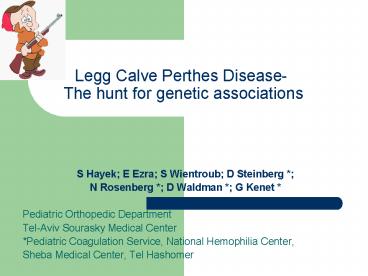Legg Calve Perthes Disease The hunt for genetic associations
1 / 10
Title: Legg Calve Perthes Disease The hunt for genetic associations
1
Legg Calve Perthes Disease- The hunt for genetic
associations
- S Hayek E Ezra S Wientroub D Steinberg
- N Rosenberg D Waldman G Kenet
- Pediatric Orthopedic Department
- Tel-Aviv Sourasky Medical Center
- Pediatric Coagulation Service, National
Hemophilia Center, - Sheba Medical Center, Tel Hashomer
2
Introduction
- LCPD is a disease of unknown origin and may be
attributed to genetic as well as environmental - risk factors
- Our aim was to evaluate the potential role of
genetic factors in LCPD patients. - We studied mutations causing thrombophilia,
Gaucher disease and inherited osteonecrosis
3
Thrombophilia
- Intravascular thrombosis may be the causative
mechanism of LCPD - The role of heritable thrombophilic risk factors
in pathogenesis of LCPD is controversial
Glueck CJ. et al Clin Orthop 1997 Gallistl SJ et
al Pediatr Orthop 1999 Hayek S et al J Bone Joint
Surg 1999 Sirvbent N et al. J Pediatr Orthop
B2000 Hresko T. et al J Bone Joint Surg
2002 Elbridge J. et al Pediatrics 2001 Hresko T.
et al J Bone Joint Surg 2002
4
Gaucher disease
- Clinical and radiological findings of
- avascular hip necrosis due to LCPD may be
indistinguishable from Gaucher disease - We previously studied Gaucher mutations among
LCPD patients and found an increase in their
prevalence.
Horwitz M et al Hum Mut 1998 Kenet G et al .
Blood Cells Molec Dis 2003
5
Inherited osteonecrosis
- Inherited osteonecrosis of the femoral head has
recently been found to be associated with variant
mutations of collagen type II.
Liu YF, Chen WM, Lin YF et al. Type II
collagen gene variants and inherited
osteonecrosis of the femoral head.N Engl J Med.
2005.
6
Methods
- Genomic DNA of confirmed LCPD patients was
analysed for the following - Thrombophilic polymorphisms
- Factor-V Lieden, 677T-MTHFR and Factor-II
G20210A. - Results were compared with 276 pediatric controls
referred for elective surgery.
- Enzyme assays were performed for
- confirmation of Gaucher disease status.
- Gaucher mutations
- N370S, G insertion (84GG), L444P,
- Intron 2(IVS21GgtA) and R496H
- Collagen mutations (COL2A1) of 12q13 gene
7
Results
- 119 LCPD patients were studied
- Male to female ratio was 3.3 to 1
- Mean age at diagnosis was -6 y
- (range 1y to 14.9y)
CATTERALL CLASSIFICATION
HERRING CLASSIFICATION
8
Thrombophilic markers in LCPD vs controls
Patients and controls were not statistically
different
9
Gaucher mutations in LCPD patients
- The prevalence of N370S mutation was 2.5
- (6/238 alleles)
- 4 patients were heterozygous and one was
homozygous - No positive cases for the other mutations.
- 26/55 patients had a low threshold (lt 1.0) for
- ?-Glucosidase enzyme activity,
- These findings are lower than the Israeli
population carriership data - (5.8 of Ashkenazi Jews)
- The association with LCPD found in a smaller
previous study was - not confirmed
Horwitz M et al Hum Mut 1998 Kenet G et al
Blood Cells Molec Dis 2003
10
Familial osteonecrosis mutations
Conclusion
- All LCPD patients were negative for COLA21
mutations
- We found no evidence that LCPD is associated with
any of the genetic factors causing thrombophilia,
Gaucher disease or familial osteonecrosis

